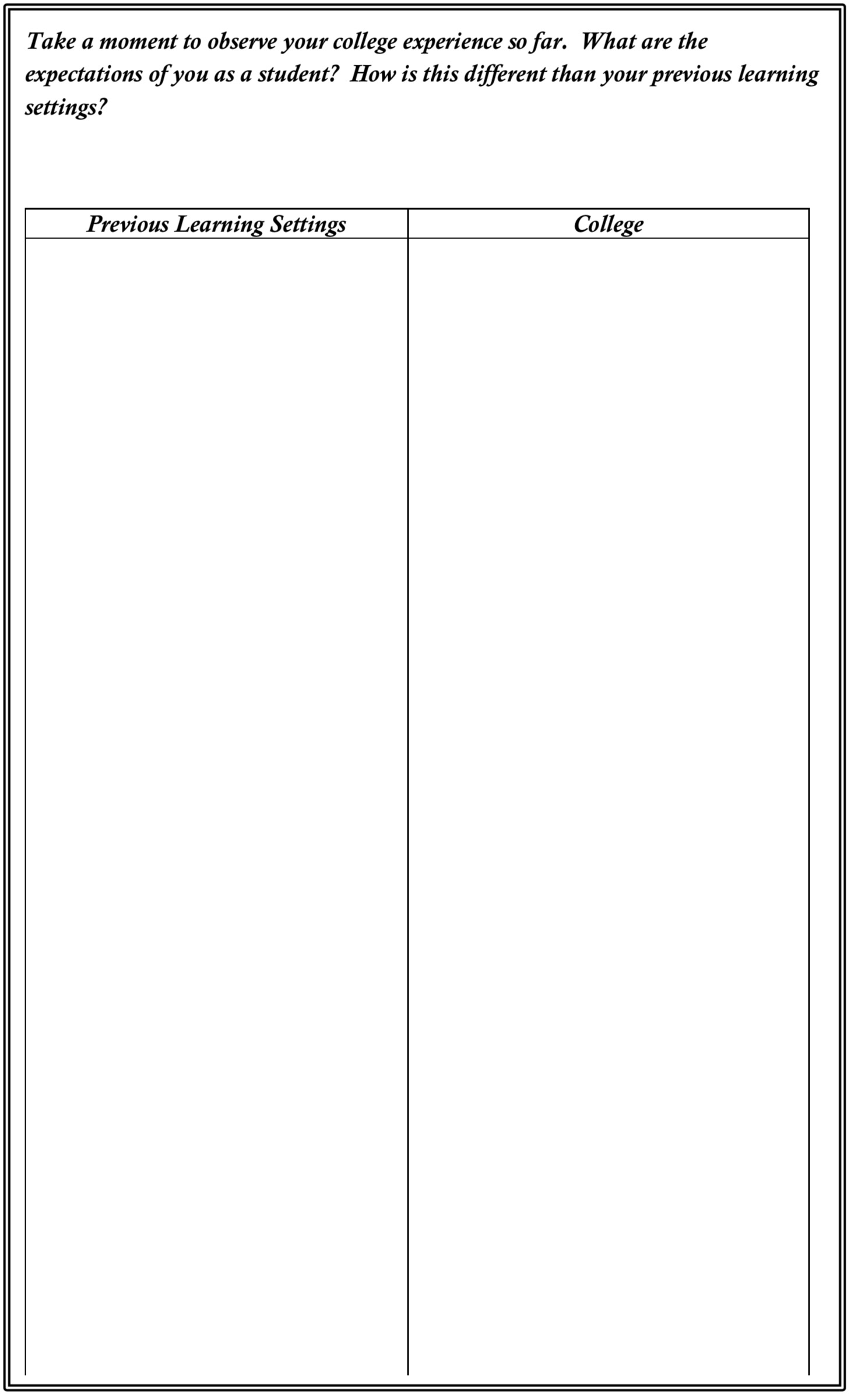1.1: PREPARING TO LEARN
- Page ID
- 13849
KNOW YOURSELF: WHAT IS YOUR LEARNING STYLE?


"Reading is a complex task. No single part of the brain can do all the work,"(Q. He)
Believe it or not, we don’t all learn the same way. In fact, reading is a new enough behavior for humans that there is no wiring in our brains specifically for reading. Each and every one of us make those neural connections differently.
This is a good reason to pay attention to your learning preferences. Being aware of your own learning preferences can help you to use strategies and tools for learning that will support what you naturally do. Of course, it’s still important to use strategies that “stretch” your brain a bit too – you never know when you might need those other strategies!
Activity:
Take the Learning Styles Assessment your instructor provides for you, or do an online search and try one of these:
-
The VARK Questionnaire
-
Multiple Intelligences Assessment
There are LOADS of Learning Style Assessments out there, so if you are really interested in this, do a search for Learning Style Assessments for Adults and you will find many options. The important thing is to learn more about yourself so you can better support your own learning.
STRUCTURING TIME TO LEARN

It may have been awhile since you’ve been in school. Or perhaps when you were in high school, you were able to accomplish everything during the hours you spent on campus. In college, you have a great deal of latitude to manage your time as you see fit. So, how will you fit everything in?
HOW TO DO IT ALL
Ok, so the reality is you cannot do it all. (Take a moment to let this digest.) The real question is, how do you get to the things that are important to you?
Start by prioritizing your To Do List. Don’t have a To Do List? Maybe you should make one. That is, unless you only have to remember two or three things. A commonly cited piece of research, known as Miller’s Law, notes that the human brain can generally remember seven plus or minus two (between five to nine) things at a time. (Notice how phone numbers and social security numbers are divided up.) Since most people attending college have busy lives raising kids, caring for older adults, running a household, working - heck, just surviving, being organized is the key to succeeding at doing it all.
You’ve seen the syllabus for this class. You are going to have to remember at least 3-4 things at a time just for this class alone, so make a list. Then prioritize. Try it in the chart below.
|
IMPORTANT or Time Sensitive |
LESS IMPORTANT but will still need to do |
DELEGATE to someone else OR LET IT GO |
|
|
Set a Schedule
Okay, not everything in life is predictable. Challenges will materialize in your path. Much of your schedule can be planned ahead, though, and if you schedule time for the important things in your life, you are much more likely to accomplish them.
How much time should you schedule for coursework and studying? According to DePaul University, a formula for success is to study or do coursework for
-
two hours per credit hour in an easy class,
-
three hours per credit hour for an average class,
-
four hours per credit hour in a difficult class.
Now consider your learning style, and productivity patterns that is, what times of day are you most productive? Schedule your coursework and study time accordingly, keeping in mind your household’s patterns of activity.
Commit to your schedule
Put your schedule on a calendar and post it where you and other people in your life can easily refer to it. OF COURSE you must attend to the important people and needs of your life -- just be sure to set healthy boundaries! Let the important people in your life know you are working toward an important goal, and you won’t be answering your cell or messages during your study hours. If you have children, then you can set up time for everyone in the family to do their homework. Modeling this behavior will be important!
Once you've allotted time for study, stick to it. If you occasionally have more time than you need for your assignments, try working ahead. Get a jump on a paper or on the next chapter of the textbook - you'll thank yourself later. Sure, you may need to adjust for the surprises, both good and bad, that pop up in all of our lives, but if you've made a place in your schedule for your school work, you won't have to face the stress of rearranging your activities at the last minute.
Making your schedule consistent and available to the important people in your life (including you) will help you to develop study habits that will make your investment in college a successful one.
Activity:
Use the calendar provided by your instructor, or one of your own to plan your schedule.
Keep in mind that everyone encounters obstacles – what are some obstacles you might be challenged by in sticking to your schedule? How will you be prepared for them?


